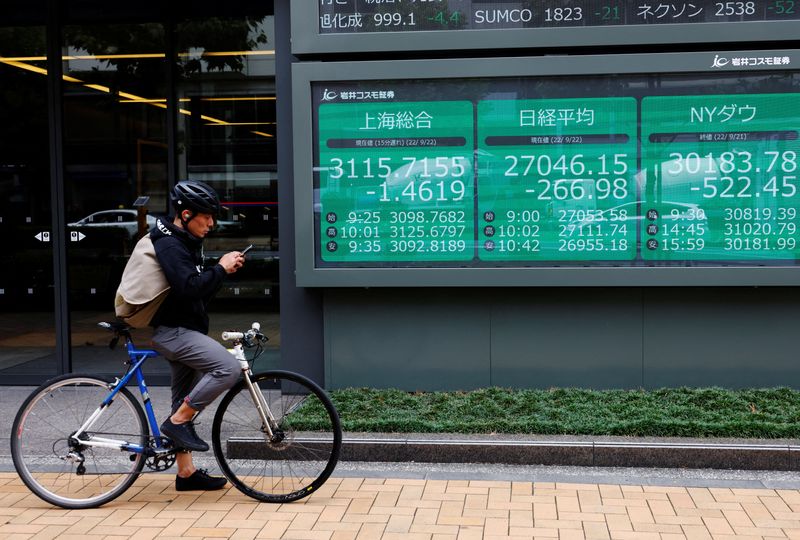Wall Street Falls on FED comments
2023.01.05 15:11

Wall Street Falls on FED comments
Budrigannews.com – As positive employment data in the United States offset China’s most recent reopening plans following the Federal Reserve’s firm message that it will not be cutting interest rates anytime soon, U.S. stocks fell on Thursday, halting a global rally in global stocks.
Asian-Pacific shares outside of Japan hit a four-month high overnight on news that China’s mainland border with Hong Kong will be reopened after three years. However, Europe was unable to keep up because the dollar and bond market borrowing costs were rising.
0.8% of the MSCI All-World index fell. The dropped 1.2 percent, 1.1%, and 1.4 percent on Wall Street.
Stephen Innes, a managing partner at SPI Asset Management, stated, “U.S. stock indexes appear neither cheap nor expensive enough to stir restless spirits.”
According to Innes, “outside of China’s exuberance, investors are likely to remain relatively defensive, probably underweight bonds and stocks, and reasonably neutral on commodities,” at least until the Fed’s January 31-Feb. meeting. One meeting has ended.
After gaining more than 3% in its first three sessions of 2023, the pan-European STOXX index ended the year lower by 0.2 percent. Better-than-expected numbers from retail giant Next lifted the entire European sector, but London’s 0.6% rise was barely enough to make up for sluggish growth in Frankfurt and Paris. .EU][.N] Investors will closely watch Friday’s U.S. jobs report for December, according to analysts, following the release on Wednesday of the minutes from the Fed’s meeting on December 13-14, which revealed that the U.S. central bank maintained its focus on lowering inflation. Bets on future rate hikes could be fueled by indications of a labor market that is still tight.
Derek Halpenny, head of research for global markets EMEA at MUFG, stated, “A strong print tomorrow and I think you are going to get a fairly rapid repricing for a 50-bps (basis-point) hike at the next (Fed) meeting.”
Investors were already savoring the ADP National Employment Report, which revealed that private sector employment increased in December compared to a month earlier. It also came a day after a moderate decline in job openings in the United States.
China, on the other hand, has abruptly eased its extremely stringent travel and activity restrictions, igniting hopes that its enormous economic engines will be able to start working again after the COVID-19 infection waves have subsided to offset slowdowns in other parts of the world.
E-commerce and consumer stocks in Hong Kong were among the biggest Asian gains on Thursday, driven to six-month highs by news of the China mainland border.
The yuan also rose by 0.11 percent to 6.8800, a four-and-a-half-month high. It also supported other currencies like the Thai baht, which has increased by nearly 14 percent in less than three months because it is now anticipated that a large number of Chinese tourists will return to Thailand.
Joanne Goh, an investment strategist at DBS Bank in Singapore, stated, “China reopening has a big impact… worldwide” due to the potential to alleviate some of the supply-chain crunches that will occur in 2022 in addition to encouraging tourism and consumption.
Goh told reporters during an outlook presentation, “There will be hiccups on the way.” It takes us six months to get used to the process. However, we don’t think it can be reversed.”
In addition, China’s central bank announced overnight that it would increase financing assistance to support a stable real estate market as well as key investment projects and domestic consumption.
In recent days, it has also eased an unofficial ban on Australian coal imports, and overnight, the Australian dollar reached a three-week high just below $0.69. It recently paid $0.67700.
After suffering its largest two-day loss for the beginning of a year in three decades, oil recovered. O/R] was last up 1.8 percent to $79.20 a barrel, and U.S. West Texas Intermediate crude futures were up 2.1 percent to $74.37 as a major fuel pipeline shutdown unexpectedly raised prices. O/R] Oil broker PVM’s Tamas Varga stated, “The rebound this morning is due to the shutdown of Line 3 of the Colonial pipeline.” Although he added, “There is no doubt that the prevalent trend is down.” It is a down market.
With a move in the opposite direction of price, benchmark 10-year Treasury yields were higher at 3.7144 percent, but they were still down nearly 10 basis points (bps) for the week. The 10-year yield on German and US government bonds was last up 2.308%. However, it has also fallen nearly 25 basis points this week, despite finishing 2022 at its highest level since 2011. GVD/EUR] This week, preliminary inflation data from Germany, France, and Spain all revealed that consumer prices increased at a slower rate in December than in November, as energy price increases eased.
As investors navigate between the Fed’s hawkish tone and the support for riskier currencies caused by China’s reopening, the climbed 0.73 percent to 104.97 in currency markets.
It was bringing the yen back down to 133.135 per dollar, reducing bets that Japan’s extremely loose monetary policy would finally be tightened this year. The euro fell 0.7% to $1.05350 as a result of the stronger dollar. USD/]
More ECB plans to raise rates until summer








